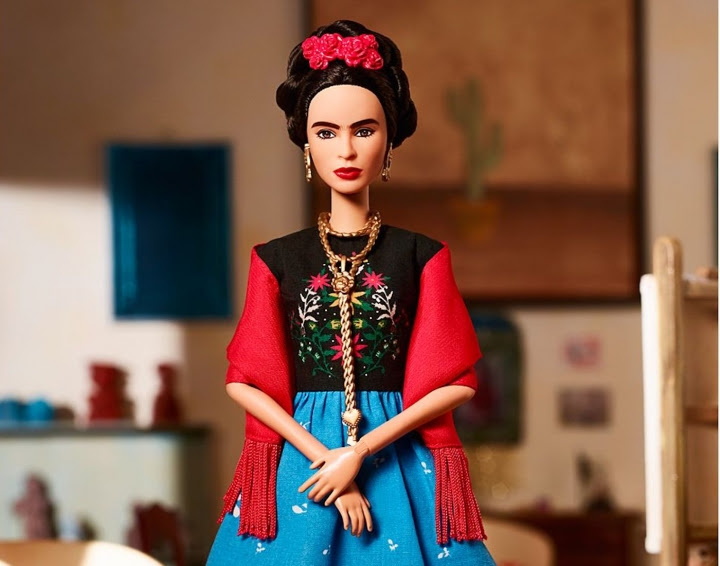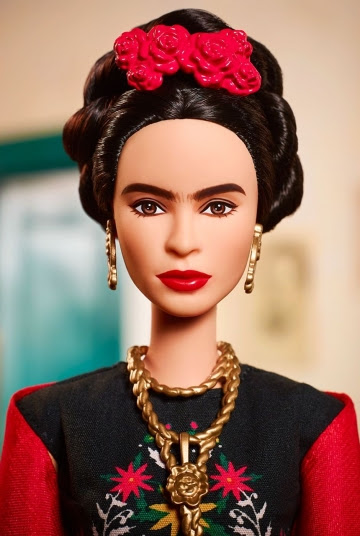The Frida Kahlo Corporation is suing the artist’s great niece, claiming she is falsely presenting herself as someone who has the power to grant licensing permits for Kahlo’s name and image.

The Frida Kahlo Barbie (photo courtesy Mattel)
The company that licenses Frida Kahlo’s name and image for use on dolls, alcoholic drinks, and a range of other products isn’t playing anymore.
On Monday, the Panama City-based Frida Kahlo Corporation (FKC) filed a lawsuit against Mara Cristina Romeo Pinedo, Frida Kahlo’s great-niece, who last month succeeded in having a temporary injunction issued in Mexico, preventing sales of the new Frida Kahlo Barbie throughout the country. The lawsuit, filed in Florida, alleges that Pinedo — who remains a shareholder and director at FKC — became dissatisfied with the group in 2011 and began a campaign to discredit and disparage the corporation and usurp its role as the licensing agent for commercial products featuring the artist’s name and likeness.
“[Pinedo], along with her daughter Mara de Anda Romeo, have published through the internet, social media, and US-based news outlets, false and slanderous press releases claiming that FKC does not own the rights that it licenses,” the complaint states. It goes on to allege that Pinedo and Romeo maintain an unauthorized website, Facebook page, and Twitter account with the ostensible purpose of issuing licenses and offering services under the “Frida Kahlo” brand, which FKC claims only it has the authority to do.
Pinedo’s mother, Isolda P. Kahlo, was Frida Kahlo’s niece and inherited the artist’s industrial property rights. In 2003, Isolda P. Kahlo gave her daughter power of attorney over her affairs, and the following year Pinedo transferred Frida Kahlo’s industrial property rights to the newly formed FKC “with the goal of commercializing the ‘Frida Kahlo’ brand,” the corporation’s complaint explains.
The Frida Kahlo Barbie (photo courtesy Mattel)
The unveiling in March of the Frida Kahlo Barbie doll, as part of toymaker Mattel’s Inspiring Women series, immediately drew Pinedo and Romeo’s ire. “I would have liked the doll to have traits more like Frida’s, not this doll with light-colored eyes,” Romeo said at the time. “I would have liked her to have a unibrow, for her clothes to be made by Mexican artisans.” The mother and daughter disputed FKC’s rights to the artist’s name and image, demanding a redesign of the Barbie. “We, the Kahlo family, are the ones who have the rights to all these things,” Romeo told the AFP last month.
Now, the FKC is seeking a judgment that will clarify its position as the sole controller of the licensing rights to Kahlo’s name and image. It is also seeking at least $75,000 in damages and for Pinedo to cease any activity wherein she claims to control trademarks related to Kahlo. The complaint does not specifically identify the dispute over the Frida Kahlo Barbie as the event that precipitated this week’s legal action — though it does allege that her social media “statements were intentional and an unjustified interference with the relationship between FKC and Mattel, Inc” — but it notes that FKC owns over a dozen trademark registrations related to Kahlo’s name in the US, Mexico, and elsewhere.
“The odd thing about the Frida Kahlo mark is that while it is well-known and has its own associations, they are more with art than merchandise,” Sam P. Israel, the managing partner of Sam P. Israel, PC and an attorney specializing in intellectual property law, told Hyperallergic. He added:
Her image is placed on any number of commercial articles such as sneakers, coasters, cosmetics, and beer, but is any of it thought of in specific association with a specific manufacturer or designer as opposed to being kitsch traded upon a famous artist’s identity? The complaint does little to answer this question in that it fails to identify specific goods and services associated with the mark as opposed to offering a litany of categories. In this regard, the disposition of the matter is less than obvious.

